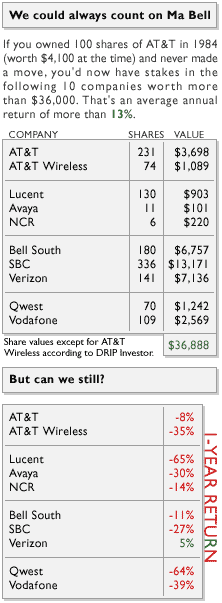|
AT&T's crumbling dynasty
|
 |
October 26, 2001: 6:49 p.m. ET
The AT&T family is bigger (and sicker) than ever. But there may be some life yet.
By Paul R. La Monica
|
NEW YORK (CNNmoney) - This week marked the one-year anniversary of the announcement of AT&T's most recent restructuring plan -- one that would split the company into four parts and ultimately determine the fate of the 126-year-old American icon.
But one year later there is more confusion than ever as to what comes next for Ma Bell.
What's more, AT&T's extended family -- the product of mergers and spin-offs dating back to 1984 -- has never been in worse shape. Throughout AT&T's decline, shareholders have at least been able to count on the Baby Bells, formed in the 1984 divestiture, and for a while, Lucent Technologies, spun-off in 1996.
All told, a shareholder in AT&T back in 1984 would now own stakes in 10 companies: AT&T; AT&T Wireless; SBC; Verizon; BellSouth; Lucent; NCR; Avaya; Qwest (which merged with former Baby Bell U.S. West); and British telecom giant Vodafone (which acquired wireless firm Airtouch, itself a spin-off of SBC-owned Pacific Bell).
And they've done extremely well: 100 shares of AT&T� -- worth $4,100 at the start of 1984 -- would now be worth more than $36,000, an average annual return of more than 13 percent (see table below).
But now Lucent, one of the best performing blue chips in the late 1990s, has its own demons and shares are down more than 90 percent from their high. And the Baby Bells, which have always been dependable gainers, are showing the first signs of problems, earlier this week reducing growth forecasts for the coming year.
Is there any hope left?
AT&T: Breaking up is hard to do
AT&T now comprises four divisions, all of which are suffering. With long-distance rates at less than 10 cents a minute, AT&T's bread-and-butter business is a huge drag on company earnings. The wireless division posted an unexpected profit in the most recent quarter, but management warned that results would slow dramatically in the fourth quarter. Revenues are sliding for the business-services division as well.

|
|
|
Stock price change from Oct. 25, 2000 through Oct. 26, 2001 | |
Then there's cable. Two years ago AT&T bet the farm -- more than $100 billion -- buying up cable companies on the idea that it would own a direct entry into people's homes that it could then use to sell all sorts of telecommunications services. Now, AT&T may be forced to sell those operations -- a current bid from Comcast values the cable assets at less than $50 billion.
The company's reorganization plan calls for spinning off all four divisions, and some say the sum of the parts will be worth more than the whole. Mario Gabelli, manager of the Gabelli Global Telecommunications fund, likes the stock mainly because of its breakup value. Even though the company's big long-distance unit is hurting, Gabelli says this old news is already factored into the stock price. "You'd have to be on Mars not to know that long distance is an eroding business," he quips.
However, what complicates any investment in AT&T (T: down $0.28 to $15.73, Research, Estimates) is the cloudy outlook. This lack of clarity is no more evident than in analysts' earnings estimates. Profit expectations for 2002 range from a low of 8 cents a share to a high of 35 cents a share -- depending which analyst is right, you're either paying a P/E of close to 200 or a more down-to-earth multiple in the mid-40s.
The Baby Bells: Slow and steady?
While AT&T has struggled to find new growth opportunities beyond long distance, its Baby Bell progeny have been far more successful. The three remaining Bells -- Bell South, SBC Communications, and Verizon -- have used their near monopoly status in local markets to expand into growth areas like wireless and high-speed digital subscriber line (DSL) Internet access.
However, shares have all tumbled lately as the economic slowdown has finally begun to chip away at earnings growth. "For a long time we watched the long-distance companies take it on the chin but the Baby Bells held their own. All of a sudden we're seeing the Baby Bells touched by the same pressures," says Jeff Kagan, an independent telecommunications analyst based in Atlanta.
Kagan believes that the Bells' problems are more economic in nature and not due to pricing pressures. So assuming the economy picks back up, the Bells should recover faster than the long-distance behemoths. In addition, the Bells are attractively valued, with P/Es around 15 based on expected earnings for 2002.
The best bet of the bunch is probably Verizon (VZ: up $0.25 to $50.86, Research, Estimates), according to Gabelli. Analysts expect Verizon to post earnings gains of 11 percent annually over the next three to five years, compared to 9 percent annual earnings growth for SBC (SBC: up $0.35 to $39.55, Research, Estimates) �and BellSouth (BLS: up $0.16 to $37.70, Research, Estimates).
Gabelli adds that the company has earned a tremendous amount of goodwill due to how it handled customers in the aftermath of the Sept. 11 tragedy. This, Gabelli speculates, could lead to some lenient treatment by the Federal Communications Commission as Verizon seeks to expand its long distance coverage in the markets it serves.
Faulty equipment
Lucent had been one of the major success stories in the technology sector during the late 1990s. Along with Cisco and Nortel, Lucent capitalized on the increased demand for networking gear that was needed to help fuel the Internet revolution. But Lucent's management made some costly mistakes.
Even before carriers started to severely clamp down on their capital spending, Lucent was in trouble. Costly acquisitions, namely a $21 billion deal for Ascend Communications, did not pan out. And Lucent was far too slow to get into the optical networking arena. As a result, the stock (LU: down $0.14 to $6.81, Research, Estimates) now trades at less than $7, a far cry from its all-time high of $76.83 in Dec. 1999.
Some value investors are beginning to nibble, but tread carefully. "It still looks like service providers are cutting back on their capital expenditure plans. Lucent could stay down at the bottom for awhile," says Kagan. And analysts don't expect Lucent to return to profitability until the December 2002 quarter.
The outlook is similarly bleak for Avaya (spun off to Lucent shareholders earlier this year) and Agere Systems (which already trades freely and is in the process of being spun off to shareholders).
Avaya (AV: down $0.10 to $9.10, Research, Estimates), an enterprise networking firm, reported a 29 percent drop in sales from a year ago and a net loss of $314 million in its most recent quarter while optical-electronics component maker Agere announced that it lost $3.4 billion in its latest quarter.
Bottom line: The Baby Bells have finally started to show some signs of weakness in light of the economic slowdown and wave of terrorist attacks. But compared to the rest of their crazy AT&T relatives, the Bells are probably the best members of the AT&T family for investors to own in this volatile market. 
|
|
|
|
|
 |

|

